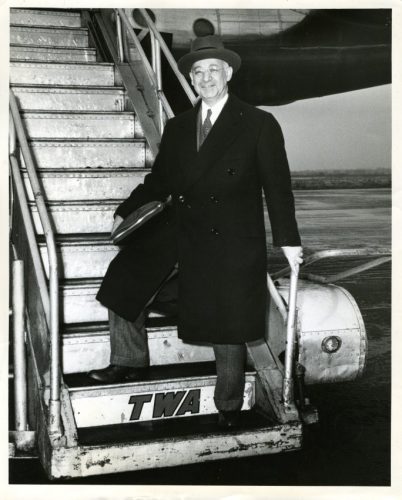The Blaustein–Ben-Gurion Agreement Part II

Written by Mark K. Bauman. Originally published in Generations 2007-2008: Maryland and Israel.
Part II: A Formal Declaration of Statehood
Missed the beginning? Start here.
The formal declaration of statehood in May 1948 and Israel’s success in securing its borders in the war that ensued transformed and intensified, rather than ended, ongoing debates over Israel’s relationship with diaspora Jewry – and, in particular, American Jewry. Fundamental difficulties over the role of diaspora Jews in forming the new nation and ultimately their relationship to it and its relationship to them can be traced to the pre-state era. For decades American Jewry had been divided as well as energized by the dream of a Jewish homeland in Palestine. From the late nineteenth to mid twentieth centuries, Zionists, non-Zionists, and anti-Zionists supported varied philosophies and rallied behind specific organizations, fighting for power and influence. Zionists, although divided over theories (as examples, the nature of the new country and the relationship between Jews and Arabs within it) and tactics, were largely united in their desire for a Jewish state. Through the American and World Zionist Organization they strove for that aim while helping run the Yishuv.[1]
For their part, Jewish non-Zionists and anti-Zionists had long aided Jews in Europe and Palestine for humanitarian reasons and as part of their opposition to international antisemitism. Nonetheless anti-Zionists opposed the creation of a Jewish state. They believed that Jews had found welcome in many of their present countries and that creation of such a state would foment dreaded charges of dual loyalty that fostered antisemitism. Non-Zionists believed that they held a middle ground. Although withholding support for political Zionism, they refrained from actively opposing it.[2]

Non-Zionists and anti-Zionists had dominated the AJComm since its inception. Leaders like attorney Louis Marshall comprised an American elite raised in Classical Reform congregations that defined Judaism as a universalistic religion of social justice. They opposed antisemitism at home and abroad as part of the fight for human rights and to secure their positions without jeopardizing them.[3] Paradoxically, their financial aid and advocacy for Jews at home and abroad reflected a sense of ethnic identity that extended the definition of Judaism beyond religion.
With the establishment of Israel in 1948, attitudes toward the new state that derived from these former stances became problematic, as all sides adjusted to a new reality. Now an elected government ran an independent nation. The creation of Israel fulfilled the Zionists’ fundamental mission. They re-directed their efforts toward assisting in the defense and prosperity of the fledgling country and also toward influencing its nature and policies. With the Holocaust and establishment of Israel, non- and anti-Zionists grappled with the existence of a Jewish state. Except for recalcitrant members of the American Council for Judaism, they accepted the new nation but, like the Zionists, needed to negotiate their relationship to it. Jacob Blaustein had to unite the different factions within the AJComm even as he sought to secure its place in the pantheon of American Jewish organizations. He simultaneously mediated with other Jewish organizations, with the American government and public opinion, and with Israeli and other world leaders.
Continue to Part III: Visions of Zion
[1] See for example, Urofsky, We Are One; Ganin, An Uneasy Relationship.
[2] Ibid.
[3] Cohen, Not Free to Desist
